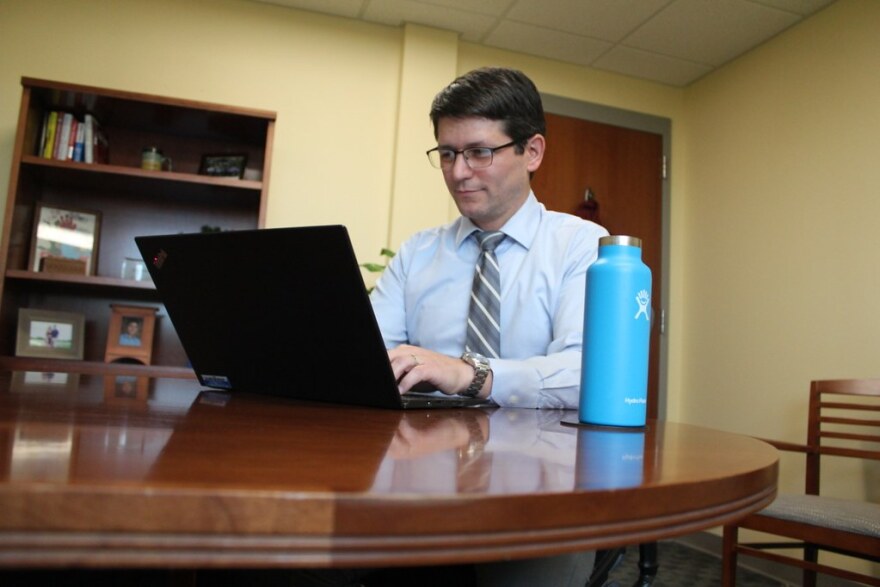For some students in Maine, college this fall might look a lot different than it did 10 years ago. The state's university system has boosted online courses by nearly 30 percent over the past five years. And it's now partnering with an outside firm to market and expand its offerings even further. But the push to reach more adult students comes with new challenges.
Some days, Jason Ennis gets to his office at MMG Insurance in Presque Isle really early, when no one's yet around. He'll pull out his laptop and launch an online learning platform that he's using to earn a business degree from the nearby University of Maine at Presque Isle.
"At lunch time, during my one hour lunch, I'll try to squeeze in half an hour of work a day, if I can," he says. "And whenn finals are due, if I'm not all caught up, like this week, I'll have to take a day or two off just to wrap it up.

Each semesters, Ennis says, he chooses what "competencies" - or skills - to learn, such as ethics and business culture. He squeezes in his readings and assignments whenever he can.
It wasn't until last year, when Ennis heard that he could complete a full business degree on his own time, with credit for some of the work he does as an enterprise architecture manager, that he finally signed up.
"I doubt that I would have the time to do it, given the time pressures I have, you know, at work and with family," he says. "Adding a traditional course load on top of that, I doubt I would have even have done it."
"So if we can educate them in place, that's better for everyone involved," says Robert Placido, the vice chancellor of academic affairs for the University of Maine System, which has introduced several new fully online programs.
The hope is that in a state where the number of college-aged graduates is shrinking, the new strategy can reach more adult learners, Placido says. "If those students are forced into a situation where they have to take time away from work, go to a campus and get a degree, leave their small towns to get that degree, then they are less likely to return to those towns."
Placido says in just the past few years the system has launched self-paced business and accounting degrees, as well as online nursing programs. It has also signed a contract with Dallas-based Academic Partnerships to market some of the new programs, find new students and advise them.
"And we call it 'intrusive advising,' where, as the students get started, our partners call them every week, and sometimes twice a week, to make sure that they have the right tools, they're financially ready to start, they are connected to the learning resources, like a writing center and math center," he says.
According to numbers reported this spring, online education in the UMaine System has surged by nearly 30% over the past five years. But some observers are raising concerns about the growth of this format, particularly for certain kinds of students.
"When it's fully online, and there's not any contact between a student and the professor, or other students - no face to face contact - then it's very difficult for students who are not already good students to succeed," says Sandy Baum, a senior fellow at the Urban Institute.
Baum says that while online learning has substantial potential and can offer opportunities, colleges need to invest in guidance and support for online students who might have struggled with traditional education.
"So one of the questions is, are they going to put enough resources into this to develop a program that really will serve these at-risk students?" Baum says.
Jim McClymer, a professor and president of the university system's faculty union, says he's encouraged that the new initiatives have started out relatively small, and that administrators have talked with professors and helped them with training. But he does have concerns that online learning might squeeze out more and more in-person options.
"There is value in face-to-face, and it can look economically appealing to, say, let them all go to online," McClymer says. "And that could be damaging to students who are here, who want that and should have that direct experience with the faculty."
But UMaine System Vice Chancellor Robert Placido says the system is working with outside agencies to adopt quality standards, and there are no plans for online courses to supplant those taught in person.
"Coming right out of high school, there's a value of getting the full experience of being in a dorm and fraternities and athletic events and, you know, sort of maturing with their peers in a safe environment," Placido says
Back at his office in Presque Isle, student Jason Ennis says he's seen both the advantages and challenges of earning a purely online degree. He likes the flexibility and guidance from an "academic success coach," but says the model does require discipline.
"You have to have your own initiative to get it done, and to get it done in a timely manner," he says. "And so that may be a struggle for some people. But it's a balance between those two worlds and what's most important to you."
And for Ennis, it's worked: He's set to earn a business degree at the end of the fall semester.
Originally published 9:43 a.m. Nov. 8, 2019



